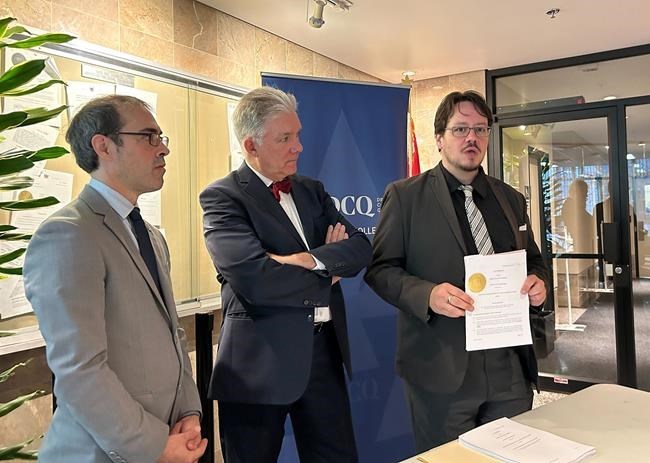
Lawyer Francois Cote, right, speaks as Daniel Turp, centre, and Etienne-Alexis Boucher of Droits collectifs Quebec look on during a media availability at Federal Court in Montreal, Nov. 1. THE CANADIAN PRESS/Sidhartha Banerjee
Republished November 12, 2024 - 2:59 PM
Original Publication Date November 12, 2024 - 11:31 AM
MONTREAL - A Quebec civil liberties group says it intends to push forward with legal action after the Supreme Court of Canada responded to its translation demand by simply removing thousands of unilingual English judgments from its website last week.
Droits collectifs Québec said the court's decision to delete the rulings doesn't resolve the issues it raised. "Our intention is to continue the proceedings which, in our eyes, are still relevant at this time, despite this somewhat desperate gesture made by the Supreme Court," Étienne-Alexis Boucher, the group's executive director, said in an interview.
The organization had gone to Federal Court alleging the high court's registrar — the court's administrative body — was not respecting the Official Languages Act. It was seeking a public apology, a judgment from the court, official translations of the English-only decisions within three years, and $1 million in exemplary damages to be shared with groups working to preserve the French language.
More than 6,000 decisions from before 1970, when rulings started to be systemically translated under the Official Languages Act, had been posted on the Supreme Court's website in English only.
On Friday, the registrar announced it was removing all pre-1970 judgments from the Supreme Court website, directing people to other online databases if they wished to consult them. The court's Chief Justice Richard Wagner said in June that the pre-1970 rulings were primarily of historical interest and the cost of translating them would be prohibitive.
The registrar said Friday that although the judgments were taken down, it would begin translating the "most historically or jurisprudentially significant" decisions from before 1970.
The Federal Court application involves decisions that were rendered between 1877 and the September 1969 entry into force of the Official Languages Act, which obliges federal institutions to publish content in English and in French. It came after the court failed to respond to a ruling from official languages commissioner Raymond Théberge declaring that decisions published on the court's website must be available in both official languages.
Théberge agreed that the law doesn't apply retroactively, but he said posting earlier decisions without translating them amounted to an offence under the act, and he gave the high court 18 months to correct the situation.
On Tuesday, Théberge said in a statement that he was aware of the Supreme Court's "new approach on publishing judgments on their website" and said his office will continue to monitor developments in the matter.
François Larocque, a University of Ottawa professor who researches language rights, said that under 2023 reforms to the Official Languages Act, the commissioner has the power to propose a compliance agreement if institutions don't follow his recommendations.
He said the removal of the unilingual decisions reflects short-term compliance.
"The spirit of the recommendation was something different … it was about making the entirety of the court's jurisprudence available to both legal audiences in Canada: the French and English legal audience," Larocque said.
"By removing all the decisions, essentially they're levelling down, right? Instead of making all the decisions available in both languages, you're just going to remove the offending ones and no one gets them on the Supreme Court website."
Larocque said access to translated versions are important, as some of the cases are still cited regularly as jurisprudence.
He said he "vehemently" disagrees with the chief justice's characterization that the rulings are just of historical interest. "Those decisions, even though they're not necessarily cited every day, are still important. They are the law of the land until they are explicitly overruled by a subsequent decision," Larocque said.
The decisions are also pedagogical tools for law professors and having them in French is important.
"I think that's the right way to view all those decisions as being part of the fabric of our legal system," Larocque said. "Everything the Supreme Court has ever done, I consider it to be important."
This report by The Canadian Press was first published Nov. 12, 2024.
— With files from Pierre Saint-Arnaud in Montreal.
News from © The Canadian Press, 2024